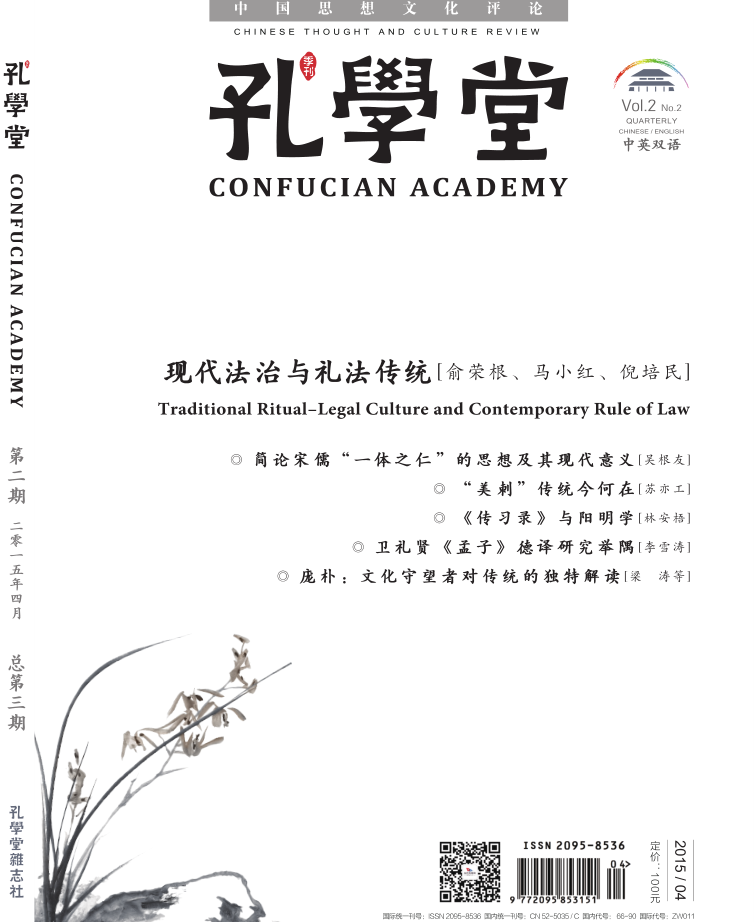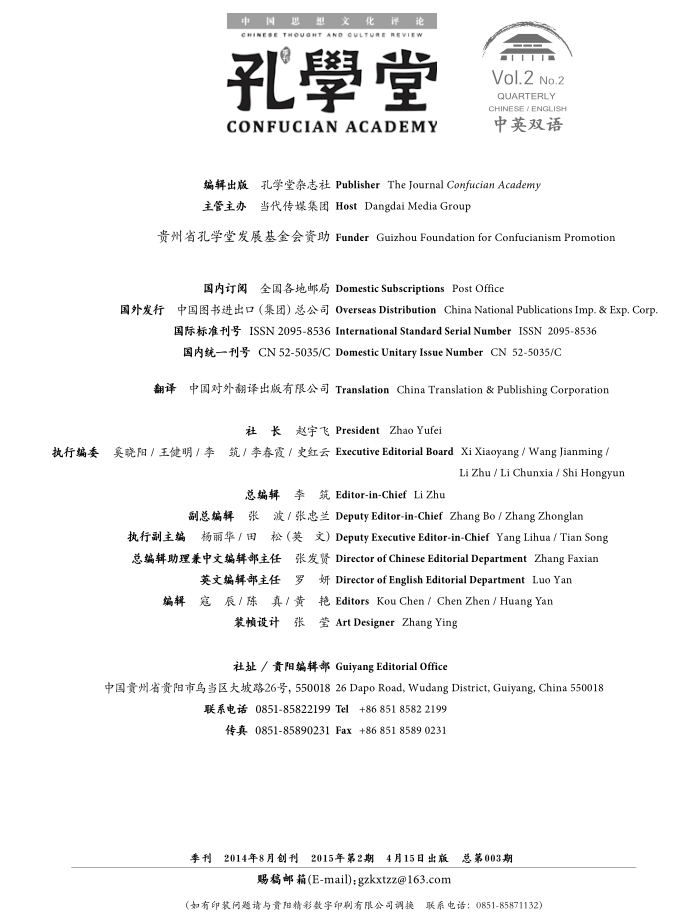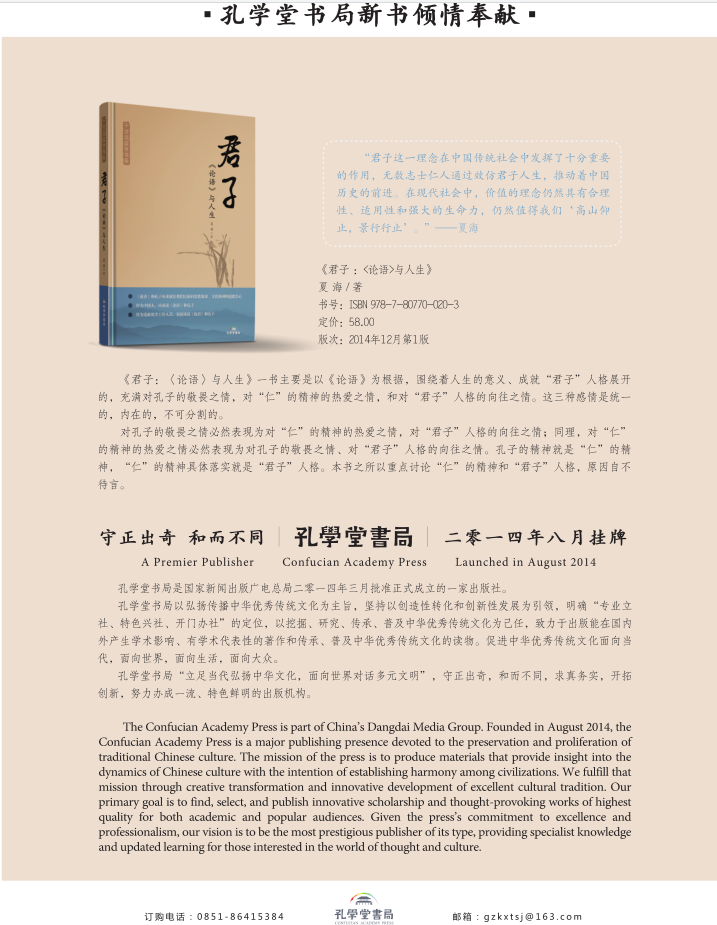


CONFUCIAN ACADEMY
Chinese Thought
and Culture Review
VOLUME 2·Number 2 ·April 2015
CONTENTS
Dialogue of Civilizations
104 Reflections on Promoting Chinese Culture Overseas
Xia Jianhui
Traditional Ritual–Legal Culture and Contemporary Rule of Law
109 The Value of Traditional Ritual and Legal Culture to Rule of Law in China
Yu Ronggen
127 Thoughts and Approaches to the Study of the Intellectual History of Chinese Law
Ma Xiaohong
137 Rule of Ritual and Rule of Law: Opposed or Complementary to Each other?
Ni Peimin (USA)
Academic Discussion
148 Song Dynasty Theories of Yiti Zhi Ren and Their Contemporary Significance
Wu Genyou
158 The Role of Traditional Poetic Praise and Satire in
Public Supervision and Social Critique in the New Media Age
Su Yigong
167 Modernization and Modernity in Contemporary New Confucianism:
A Critique of Critical Theory
Lee Shui-chuen (Chinese Taipei)
176 Confucian Philosophy’s Ultimate Concern
Tian Wei
Yangming Culture
183 Philosophy of Wang Yangming: His Chuan Xi Lu
Lin An-wu (Chinese Taipei)
Horizon of Sinology
197 A Brief Review of Richard Wilhelm's German Translation of Mencius
Li Xuetao
Masters of Chinese Studies
212 Pang Pu: A Guardian of Chinese Culture
Liang Tao and Xu Qingwen
Studies by Young Scholars
221 The Pre-Qin Confucian Concept of Quan and Its Comparison with Aristotelian Philosophy
Wang Jian
Classics Review
234 Spiritual Awakening among Ancient People
Liu Jiahe
Main articles Abstract
Reflections on Promoting Chinese Culture Overseas
Abstract: Confucius Institutes have become a worldwide brand in China’s efforts to share its culture with international audiences, which provide a prime example of educational and cultural exchanges and cooperation between China and other countries. However, Confucius Institutes still face issues such as a lack of suitable staff. To promote Chinese culture overseas, efforts should be made in four aspects: introducing Confucius to the world more broadly, systematically reviewing and linearly presenting Chinese culture, comparing Chinese and other cultures in order to adapt foreign things for Chinese use, and keeping an eye on bigger issues while starting with smaller ones.
Keywords: Confucius Institute, Chinese culture, international communication
Xia Jianhui is Deputy Dire ctor-General of China’s Confucius Institute Headquarters and Deputy Director of Hanban.
The Value of Traditional Ritual and Legal Culture to Rule of Law in China
Abstract: The time-honored li–fa (ritual and legal) culture gave birth to China’s legal system, and the latter in turn consolidated this traditional culture. There are many good examples of liangfa shanzhi (good law and good governance) in China’s history, such as “Virtues are central, punishment supplements them,” “To govern, one must rule with virtue,” “appointing people according to their merits,” the “civil-service examination system,” “righteousness and integrity outweighing profit,” “being pertinent, cautious, and considerate in applying a criminal penalty based on the Way of Centrality,” the pursuit of no litigation, and quelling litigation through mediation. To strengthen rule of law, China should make its jurisprudence and legal institutions intended for national governance instead of revolution, as well as stamp them with Chinese characteristics even though most are introduced from the West. During this transformation, we should take rich nutriment from ritual and legal traditions and innovatively integrate them into modern legal institutions.
Keywords: China’s legal system, ritual and legal culture, liangfa shanzhi, rule of law in China
Yu Ronggen is professor at the Southwest University of Political Science and Law.
Thoughts and Approaches to the Study of the Intellectual History of Chinese Law
Abstract: Reflecting on the existing issues in studies of the intellectual history of Chinese law, the author argues that such studies should focus on the development of traditional fa (law, legal) thought, with an emphasis on the practical significance of such thought from the perspective of modern law. Reflection and criticism, along with inheritance and advancement, are the proper disciplinary approaches to the study of the intellectual history of Chinese law. For scholars themselves, the development of independent personality is crucial in any field of academic research. In addition, when studying legal thought in traditional China, li (rites) should also be considered.
Keywords: legal thought, intellectual history, Chinese law, disciplinary approaches
Ma Xiaohong is a professor and doctoral supervisor at Renmin University of China and a visiting researcher at the Center for Coordination and Innovation of Judicial Programs 2011.
Rule of Ritual and Rule of Law: Opposed or Complementary to Each other?
Abstract: Confucian rule of ritual should not be viewed as in conflict to the rule of law; instead both of them should be viewed as indispensable and mutually complementary layers of the Confucian governing system. The view that rule of law advocates consistency and rule of ritual advocates unequal treatment is an oversimplification of the matter. Both of them recognize relationships and the need to have special privileges for certain groups of people. The purpose of the Confucian ritual propriety is not to enforce privileges of the upper class, but to clarify reciprocal responsibilities. The more a person has power, wealth, and influence, the more social responsibility the person has. Therefore, the construction of a legal system needs to implement, rather than reject, the reciprocal spirit of Confucian rituals. Modern criticisms of Confucianism should be more specifically targeted toward the rituals that are outdated and unreasonable rather than toward rituals in general. Good rituals are not fetters of human freedom; to the contrary, they are necessary conditions for human freedom. Last but not least, when there are indeed conflicts between rituals and laws, they should not be viewed as conflicts between two normative principles, as they may well be conflicts between short-term interests and long-term interests. Furthermore, quandaries caused by conflicts of different considerations are not unique to the tension between rituals and laws, much less that when there is tension between rituals and laws the former is always to be blamed. Only by avoiding the aforementioned misconceptions can the construction of legal and ritual systems be on a healthy track.
Keywords: Confucianism, rule of ritual, rule of law, equality, freedom
Ni Peimin is professor and Director of East Asia Studies at Grand Valley State University, USA.
Song Dynasty Theories of Yiti Zhi Ren and Their Contemporary Significance
Abstract: The theory of yiti zhi ren (benevolence in all things as a whole) put forward by Song dynasty Confucians further developed pre-Qin Confucian ideas on benevolence. Zhang Zai, the Cheng Brothers, and Zhu Xi all accepted the idea of yiti zhi ren, though they had dissimilar understandings of it. Their endorsement of this idea generated consistent theorizing on benevolence throughout the Song dynasty. Through the Ming and Qing dynasties this theory was further developed by Wang Yangming, Wang Gen, Li Zhi, and Tan Sitong. These later developments suggested that benevolence should first be based on tong (communication), which helped associate the theory of yiti zhi ren with modern humanitarian themes. Today this theory can also be interpreted from an ecological perspective and can provide a Chinese philosophical basis for ecologism.
Keywords: Neo-Confucianism, yiti zhi ren, benevolence, Zhang Zai, Cheng brothers, Zhu Xi, ecology
Wu Genyou is professor, PhD supervisor, and Dean of the School of Philosophy at Wuhan University.
The Role of Traditional Poetic Praise and Satire
in Public Supervision and Social Critique in the New Media Age
Abstract: China has had a distinctive political culture since ancient times. The practice of shi jiao (poetic moralization), which began with the Book of Songs in the Xia, Shang, and Zhou dynasties, remains influential. With the rise of Confucianism in the Han dynasty, poetry was further defined as a form for praise and satire. In this sense, poetry, ballad, adage, and other artistic forms became a subtle way to praise good things and satirize the bad, thus improving governance and society. For two thousand years, this dual function of poetry has worked wonders in political systems. Even in the new media age of Web 2.0, poetry continues to exert positive influence through various channels.
Keywords: poetic moralization, aspirational poetry, confrontational democracy, social media, text messaging, WeChat
Su Yigong, Doctor of Laws, is a professor of the School of Law at Tsinghua University.
Modernization and Modernity in Contemporary
New Confucianism: A Critique of Critical Theory
Abstract: Contemporary New Confucianism faces the question of how to modernize Confucian philosophy and culture without becoming ensnared in the dark side of Western modernity. Through a comparison with critical theory, this paper examines Confucianism’s critical aspect toward culture. Critical theory, which has as its basis objective knowledge, is averse to ideology, seeking to liberate people from self-deception and self-imposed oppression, which are part of the dark side of modernity. Jürgen Habermas criticized the dominance of instrumental rationality and supported a reversion to practical reason in order to achieve modernization, whereas postmodernists argued that modernity is just the oppression of the individual through reason. Therefore, postmodernists opposed rational discourse, seeking individual liberation instead. This paper argues that both Habermas and the postmodernists were partially correct about Western modernization, as practical reason is not only a source of criticism, but can also oppress individuals. A culture’s continuation depends on the rational and sustainable development of its concepts, namely, on whether or not cultural concepts can strengthen self-recognition through introspection. Confucianism regards benevolence as the driving force of history and culture. Benevolence promotes a rational and introspective cultural development process. This paper also uses Confucianism as a parallel to critical theory in order to examine the nature of the May Fourth Movement. As the movement sought the modernization of Chinese culture while totally discarding tradition, the movement was counterproductive to rational introspection and self-recognition. Contemporary Confucians renovate the traditional idea of “outer kingliness” that aims to return the practical reason of benevolence to its rightful place. The traditionally critical features of Confucianism can thereby be fully extended to make Chinese culture universal, exceeding Western modernization.
Keywords: Contemporary New Confucianism, critical theory, modernization and postmodernization, practical reason, May Fourth Movement
Lee Shui-chuen is a professor of the Graduate Institute of Philosophy at National Central University in Taiwan.
Confucian Philosophy’s Ultimate Concern
Abstract: Immortality is the ultimate concern of Confucian philosophy. Its meaning is threefold. First, what one does in life does not disappear with death, but continues to impact posterity; an individual’s life can be as immortal as history, which is the noble character sought after by sages and men of virtue. Second, the continuation of the family line through children breaks free of the limits of a single person’s life, which is the plain and fundamental teleology of any individual. Third, the pursuit of the unity of Heaven and man transcends the shackles of individual existence, leading to an unlimited freedom and revealing a humanistic and religious nature. In other words, the Confucian concept of immortality is imbued with moral humanism by adherence to a socio-historical perspective, with human relations by emphasis on the continuation of the family line, and with aesthetic existence through the unity of Heaven and man.
Keywords: ultimate concern, immortality, historical memory, continuation of the family line, unity of Heaven and man
Tian Wei is a professor and PhD supervisor of the School of Philosophy at Tsinghua University.
Philosophy of Wang Yangming: His Chuan Xi Lu
Abstract: This paper aims to introduce Wang Yangming’s Chuan Xi Lu (Instructions for Practical Living), highlighting the great significance of chuan xi (teaching and practicing) in carrying forward the sages’ thoughts from generation to generation. First, this paper explores the meaning of chuan xi, revealing three dimensions of life and the sense of Confucianism contained within. Second, this paper examines Wang Yangming’s daily moral practice in order to understand the evolution of his doctrine of the mind, which advocates that mind is the principle, one’s intuitive knowledge should be extended, and one should practice in accordance with one’s mind. In this theory, the extension of intuitive knowledge is the guiding principle, mind as principle is the substance, and the unity of knowledge and practice is the function. The function reflects the substance, while a complete understanding of the substance helps accomplish the function. This is called the unity of substance and function. Finally, the paper concludes with Wang Yangming’s “Odes to Intuitive Knowledge.”
Keywords: doctrine of the mind, extension of intuitive knowledge, unity of knowledge and practice, substance and function, good and evil
Lin An-wu is a professor at and director of the Institute of Religion and Humanity at Taiwan Tzu Chi University. He is also the founder of the Yuanheng Academy.
A Brief Review of Richard Wilhelm’s German Translation of Mencius
Abstract: The academic community involved with the studies of Richard Wilhelm generally focuses on his translations of the Analects and Daodejing but rarely discusses his German translation of Mencius. Based on primary resources, this study compares Wilhelm’s translated texts in order to systematically examine his translation activities, with a focus upon the interrelationship between his translation and his study of Mencius during different periods of time. This study also investigates the Christian thought and culture reflected in the translation of Richard Wilhelm as a Protestant missionary.
Keywords: Richard Wilhelm, Mencius, translation studies
Li Xuetao is a professor and doctorate supervisor, Dean of the Institute for Global History at Beijing Fore ign Studies University.
Pang Pu: A Guardian of Chinese Culture
Abstract: Pang Pu had a unique understanding of Chinese cultural traditions. He argued that while Western dialectics believe that everything has two sides, Chinese dialectics stress that it has three. The idea of one dividing into three is the key to Chinese culture. Using this method, Pang Pu settled a long-standing controversy regarding Zisi and Mencius’s theory of wuxing (the five modes of proper conduct, which are benevolence, righteousness, propriety, wisdom, and sageliness) and systematically analyzed early Confucianism and its relationship with Daoism. As a leader in the Cultural Fever of the 1980s, Pang Pu insisted that culture is nation-specific and time-specific. This has become an important viewpoint in the study of Chinese culture. In his life, Pang Pu was fashionable and tolerant, revealing a charming personality and scholarly wisdom.
Keywords: Pang Pu, Confucianism, Cultural Fever, one dividing into three
Liang Tao, professor and PhD supervisor, is Vice President of the School of Chinese Classics at Renmin University of China;
Xu Qingwen is an associate professor of the Advanced Institute for Confucian Studies at Shandong University.
The Pre-Qin Confucian Concept of Quan
and Its Comparison with Aristotelian Philosophy
Abstract: The pre-Qin Confucian concept of quan (expediency) could be trichotomized into quanyi (expedient elasticity), quanheng (expedient balance), and quanbian (expedient tactics). Quanyi focused on adaptability and flexibility, quanheng on comparison and selection, and quanbian on unconventionality and innovation. Functionally the three types of quan were similar to each other in proposing the course of action for individuals and creating or reforming cultural institutions for communities, for example systematized proprieties. The Confucian discourses on quan and its variants gave expression to the practical wisdom of ancient sages such as Confucius, Mencius, and Xunzi. Moreover, they possessed many similarities to Aristotle’s golden mean and epieikes (the equitable).
Keywords: Pre-Qin Confucianism, quan, quanyi, quanheng, quanbian, Aristotle
Wang Jian, PhD, is associate professor at Guizhou Normal University and Associate Research Fellow of the Guizhou Institute of Yangming Culture.
Spiritual Awakening among Ancient People
Editor’s Note: Civilizations around the globe underwent significant spiritual breakthroughs from the eighth to the third century B.C., when great thinkers such as Socrates, Plato, Aristotle, Sakyamuni, Confucius and Laozi appeared in ancient Greece, India and China. The intellectual traditions created by these leaders still influence the lives of present-day humans. Karl Jaspers, a philosopher from Germany, called this key historical period of human spiritual civilization the Axial Age. Responding to the Jaspersian coinage, Liu Jiahe, a prominent historian from Beijing Normal University, wrote an article “Spiritual Awakening among Ancient People,” which was published in the Journal of Beijing Normal University, No. 5, 1989. In this article, Prof. Liu greatly discussed the connotations, historical conditions and characteristics of spiritual awakening in ancient India, Greece and China, which attracted worldwide attention of academic communities and was included in some proceedings.
When interviewed by the editors of Confucian Academy, Prof. Liu said that the self-reflection and spiritual awakening of human beings still interested him. He added that research in this field had improved greatly in the past two decades owing to the emergence of new resources and ideas. With Prof. Liu’s consent, the Confucian Academy republishes this article, hoping that it will reinvigorate academic discussion on this issue. Given the limited space, only the section on the characteristics of spiritual awakening is quoted here.
Liu Jiahe is a professor in the School of History at Beijing Normal University. He is also a member of the editorial board of the American Journal of World History.

